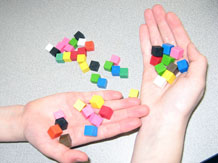No
My answer to a similar (but not identical) question was that there's a limit to how nutrient dense you can make your food or the human body can't absorb it.
The problem is that very nutrient dense foods suck water out of your body through osmosis. This leaves the consumer dehydrated and they still aren't able to absorb the nutrients.
If you perform the math on the numbers provided in the answer linked above and for a 2000 kcal diet (average for a male), the densest nutrient concentrations a person could easily tolerate would require them to consume about 6-8 $Ensure^{TM}$ per day. The total mass of this would be $7 \times 240 g $ ~ $1.7 kg$. To this you'd need to include an extra supply of water since the quantity provided in $Ensure^{TM}$ would be insufficient to sustain a person.
I realize this number seems high, but realize that this 1.7 kg (3.7 lbs) of food includes 1.3 liters (2.8 lbs) of your daily water requirements.
Yes
Instead of consuming your "food pill" directly, if you instead dropped it into a container of water and drank the results, that would probably work if you got the quantities right.
In this case, your "food pill" for a day's rations would mass about 0.4 kg (0.9 lb) and would need to be dissolved in the quantity of water identified above.
Other Stuff
Preferences
As a person with digestive issues, I've been forced to use $Ensure^{TM}$ to supplement my diet. I never drank it because I liked it. This stuff tastes OK but it isn't something most people would choose over regular food.
Long-term Use
Perhaps more important, we still do not know all the nutrients the human body needs to stay healthy. We know the macronutrients (fat, carbohydrates, protein, and water); we know the micronutrients (vitamins & minerals) but we do not know the trace nutrients that are beneficial.
The trace nutrients are those chemicals are the ones scientists look for in wine, coffee, chocolate, etc. Scientists are constantly changing their minds about whether this food or that are good or bad for you.
A diet of only these concentrates will keep you going but might lead in the long-term to a variety of difficult to diagnose issues. We just don't know enough about it right now.
Costs
Right now, these concentrated foods are substantially more expensive than the food that they'd replace (perhaps $10 / day). If you wish to solve world hunger it does have some advantages though:
- Light weight - easy to transport
- Shelf stable - no spoilage
Solving Obesity
As our knowledge of obesity increases, this answer may become dated but current research implicates many factors of which layman are unaware.
Factors which may cause obesity:
- diet
- inactivity
- hormone imbalance
- certain viral infections
- gut biome
- depression / mental health
- genetics
- lack of sleep
- medications
Of these, the "food pills" might only solve #1 or possibly #5 if the "food pills" were laced with gut biota known to be a good & healthy mix.
I suppose it's possible that a sophisticated society could generate "food pills" based upon a doctor's prescription in which case #3, #4, & #6 might also be addressed by taking your and only your "food pills".
Hunger
as a motivational state.
The hunger mechanism in people is fairly complicated, can be triggered or suppressed by several different factors, and has different processes over short and long terms.
Short-term regulation of hunger and food intake involves neural
signals from the GI tract, blood levels of nutrients, and GI tract
hormones.
A food pill can be designed in a way that triggers all the right GI tract and blood monitoring triggers as long as the "pill" contains "bulk" for the GI tract to work on. Fiber would fill this need quite well. Furthermore, current diet nutritional shakes already include fiber in their formulations for just this reason.
Eating as a sensory experience
I think one area in which this idea fails would be when "eating as a sensory experience" When humans really indulge in the pleasures of eating, we engage more senses than just taste. We enjoy different textured food (touch), foods with pleasing aromas (smell), colorful arrangement (sight), and even sometimes foods that make sounds when eaten (sound).
Food pills might be able to accommodate taste and to a lesser extent smell but would leave out the other senses. For these reasons (and a few others), I don't think food pills would ever replace "real food" on the luxury market.

